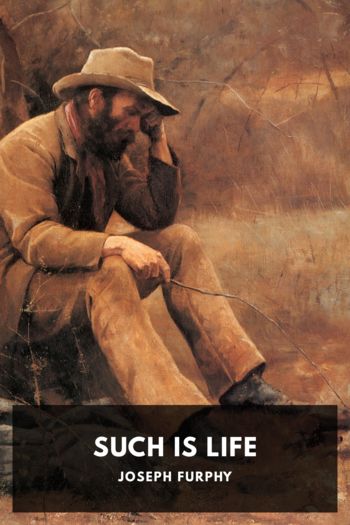Such Is Life - Joseph Furphy (philippa perry book txt) 📗

- Author: Joseph Furphy
Book online «Such Is Life - Joseph Furphy (philippa perry book txt) 📗». Author Joseph Furphy
Yes; better things. For, mind you, beyond this rollicking blackguard there stood a second Jack, a softhearted, self-sacrificing other-phase, chivalrous to quixotism, yet provokingly reticent touching any act or sentiment which reflected real credit on himself. Not that every blackguard is a Bayard, any more than every wife-beater is a coward; but almost all moral and immoral qualities are in reality independent of each other. And Jack, for one thing, was eminently religious—as indeed were those greater geniuses and equally hard cases, Dick Steele and Henry Fielding. Says the First Lord (neither of the Admiralty nor the Treasury), “The web of our life is of a mingled yarn, good and ill together; our virtues would be proud if our faults whipped them not; and our crimes would despair if they were not cherished by our virtues.”
“I always make a bit of a prayer before turnin’-in,” remarked Jack, in appendix to a story which Chaucer or Boccaccio would have rejected with horror; then the poor fellow laid his pipe on the table, and, kneeling by his bedside, repeated in a firm, reverent voice an almost unrecognisable version of the Lord’s Prayer, and an unconscious parody on Ken’s Evening Hymn:—“Glory to Thee, my God, this night.”
“See, it’s this way with me,” he continued, rising from his knees and re-lighting his pipe—“las’ time I seen my pore mother—widow-woman, she was, for my ole man he ’d shipped bo’sun o’ the Raglan, las’ time she weighed—‘Jack,’ says the ole woman to me, an’ the tears rollin’ down her face—it’ll be goin’ on five year ago now—‘Jack,’ says she; ‘promise me you’ll always make a bit of a prayer before turnin’-in; for the Lord says anybody that’s ashamed o’ Him, He’ll be ashamed o’ him at the day o’ judgment.’ Awful—ain’t it? Course, I promised, but it went in o’ one ear, an’ out o’ the other, till about two year after, when I got word she was dead. I was on Runnymede then—for I come straight here when I bolted from the ship—an’ I begun to bethink myself that she could see how I was keepin’ my promise; so I braced-up, an’ laid a bit closer. Lord knows, I gev her worry enough while she was alive, without follerin’ her up any furder.” I have taken some trouble in weeding the language of Jack’s confession, so as not to destroy its consecutiveness.
And, coexisting in the worthy fellow’s mind with this childlike simplicity, was a really fine store of the best kind of knowledge, namely, that acquired from observation and experience. It is surprising how much a landsman, however well-informed, may gather from a sailor when he listens like a three-years’ child, and the mariner hath his will. I only wish I was as well posted up in devilfish, stingarees, krakens, and other marine commonplaces, as I am—thanks to Jack’s information—in the man-o’-war hawk and the penguin. It came about in this way:
The door was left open for ventilation when we retired to rest, Jack in his bunk, and I on the floor. We were both asleep, when I became aware of an icy touch on my face, accompanied by a breath strongly suggesting to my scientific nose the hydro-carburetted oxy-chloro-phosphate of dead bullock. Drowsily opening one eye, I saw Pup standing by my side. He had thought I was dead; but, finding his mistake, he walked away through the gloom with an injured and dissatisfied air, and began trying to root the lid off Jack’s camp-oven with his pointed nose. One peculiarity of the kangaroo-dog is, that though he has no faculty of scent at the service of his master, he can smell food through half-inch boilerplate; and he rivals Trenck or Monte Cristo in making way through any obstacle which may stand between him and the object of his desires.
The clattering of the oven-lid roused Jack. He looked up, and then left his bed.
“Pore creature’s hungry,” is near enough what he said. He opened a sort of safe, and took out all the cooked mutton, which he divided into two unequal portions, then gave the smaller share to his own dog, and the larger to Pup. “Bit evener on your keel after you’ve stowed that in your hold,” he soliloquised profanely.
“Thank-you, Jack!” said I. “Would you just see that everything’s safe from him before you turn-in again. There’s always a siege of Jerusalem going on in his inside. The kangaroo-dog’s the hungriest subject in the animal kingdom.”
“Well, no,” replied Jack forbearingly, as he returned to his bed; “he ain’t in it with the man-o’-war hawk. That’s the hungriest subject goin’; though, strictly speakin’, he don’t belong to no kingdom in particular; he belongs to the high seas. If you’d ’a’ had a chance to study man-o’-war hawks, like I’ve had, you’d never think a kangaroo-dog was half hungry. Why, he dunno what proper hunger is.”
Then he gave me such a description of this afflicted bird as, in the interests of science, I have great pleasure in laying before the intelligent public. I must, however, use my own language. Jack’s rhetoric, though lucid and forcible, would look so bad on paper that the police might interfere with its publication.
The man-o’-war hawk, it appears, utters a thrilling squeal of hunger the moment his beak emerges from the shell; and this hunger dogs him—kangaroo-dogs him, you might say—through life. At adult age, he consists chiefly of wings; but, in addition to these, he has a pair of eager, sleepless eyes, endowed with a power of something like 200 diameters; and he has also a perennially empty stomach—the sort of vacuum, by the way, which Nature particularly





Comments (0)